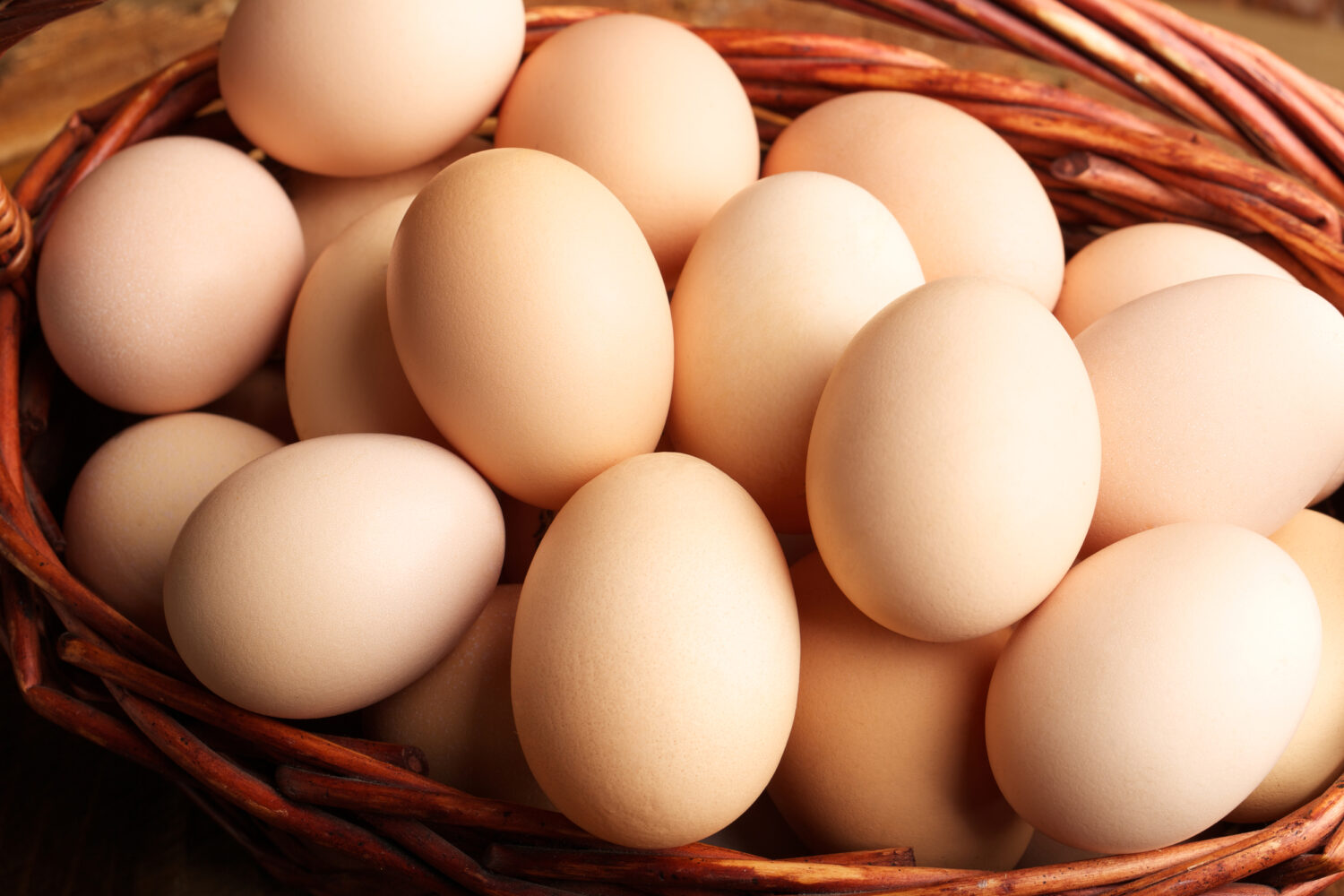
Preserve Eggs With Slaked Lime or Water Glass
In the 1800s, before artificial light was available, chickens laid far fewer eggs in winter than in the summer. Homes did not have electrical refrigeration and ice boxes were too small to store much food. Therefore, people had to find a way to preserve eggs for times when eggs were scarce.
This post is a continuation of ways to preserve eggs. You can read the previous post here, How to Preserve Eggs for Winter.
Two additional ways of preserving eggs without refrigeration is to use either slaked (also called slacked) lime or water glass.
NOTE: These are two SEPARATE ways to preserve eggs. You can use slaked lime OR water glass, but not both together.
DEFINITIONS:
Slaked/slacked lime is calcium hydroxide. It is made when calcium oxide (called lime or quicklime) is mixed, or “slaked” with water. Limewater is the common name for a saturated solution of calcium hydroxide. Reference – Wikipedia.
Water glass is sodium silicate and was used as an egg preservation agent through the early 20th century with large success. Eggs can be kept fresh using this method for up to five months. When boiling eggs preserved this way, pin-prick the egg to allow steam to escape because the shell is no longer porous. Reference – Wikipedia
=================================================
INFORMATION BELOW COMPILED FROM 1800s COOKBOOKS
EGG PRESERVATION WITH LIME
Put some lime in a large vessel and slack it with boiling water till it is of the consistence of thin cream. You may allow a gallon of water to a pound of lime. When it is cold, pour it off into a large stone jar.
Be sure that the eggs are fresh and place them in the jar, with the pointed ends down, being sure that each end is perfectly sound. Cover the jar closely. See that the eggs are always well covered with the lime-water, and lest they should break, avoid moving the jar.
If you have hens of your own, keep a jar of lime-water always ready, and put in the eggs as they are brought in from the nests. Jars that hold about six quarts are the most convenient. It will be well to renew the lime-water occasionally.
Another way — To one pint of slacked lime, add one pint of salt, two ounces of cream of tartar, and four gallons of water. Boil all together for ten minutes. Skim and when cold, pour it over the eggs. Lay a light saucer upon the top to keep them under water, and keep in a cool place. Renew the lime-water every three weeks. You may add an ounce of saltpeter* to it.
*saltpeter – potassium nitrate, an early food preservative, but rarely used now.
=================================================
EGG PRESERVATION WITH WATER GLASS
Putting eggs down in a solution of water glass is without doubt the most satisfactory method of storing them in the home.
The commercial form of water glass is usually a mixture of potassium and sodium silicate, which, besides being cheaper than that which is chemically pure, is the kind that is preferred for the purpose of preserving eggs.
To make a solution of the desired strength to preserve eggs satisfactorily, dissolve one part water glass in seven parts of warm water that has first been boiled to drive off bacteria, mold, spores, etc. With the solution thoroughly mixed, it is ready to pour over the eggs.
In selecting eggs for the purpose of storing, be careful to choose only those which are clean, fresh, and perfectly sound, and, if possible, infertile. It is advisable not to wash them before they are put into the preservative, for they will keep better if their bloom is not removed.
Place the eggs in receptacles in the manner explained for preserving eggs in limewater, and over them pour the water-glass solution until they are all covered. If the eggs so prepared are stored in a cool place, they will keep as long as those preserved in limewater and there will be no danger of their acquiring any foreign flavor.
Image from Deposit Photos
=====================================================
The information above is from a cookbook published in the 1800s. People today, especially those raising their own chickens, are also interested in preserving eggs.
Based on online articles and videos, I’ve included a few additional tips:
- Make sure your eggs are fresh.
- Do not wash your eggs. If dirty, wipe with a cloth or use them instead.
- Gallon jars with wide lid openings are good containers to use to store eggs.
- Try not to move your container once you add your eggs. If an egg cracks, it’ll ruin your whole batch.
- Cover your container tightly so the solution doesn’t evaporate.
- Date your container so you’ll know when you started.
- A white crust in lime water just means the solution was exposed to air and is harmless.
- If you see any mold, throw out the entire container of eggs. You don’t want to risk illness.
- The average time for storing eggs is about seven months.
- Crack each egg in a bowl prior to using just in case one is bad.
=================================================
Have You Ever Preserved Eggs? Please Leave a Comment Below.
=================================================
 VINTAGE COOKING from the 1800s ~ EGGS
VINTAGE COOKING from the 1800s ~ EGGS
by Angela Johnson
How did people cook and store eggs without electricity?
This book tells how to determine freshness, how to cook, and how to preserve eggs.
Recipes include Fried, Poached, Baked, and Boiled Eggs, Omelets, Soufflés, Egg Balls, Custards, Puddings, Dressing, Sauces, Creams, Drinks, and more…..
Available from these online Retailers:
Amazon, Kobo, Apple, Barnes&Noble, Scribd, 24 Symbols, Playster, Angues & Robertson, Mondadori Store, and more
Also available as Regular Print and Large Print
on Amazon.
=================================================
Preserving Food without Freezing or Canning
Traditional Techniques Using Salt, Oil, Sugar, Alcohol, Vinegar, Drying, Cold Storage, and Lactic Fermentation
Typical books about preserving garden produce nearly always assume that modern “kitchen gardeners” will boil or freeze their vegetables and fruits.
Yet here is a book that goes back to the future—celebrating traditional but little-known French techniques for storing and preserving edibles in ways that maximize flavor and nutrition.
=====================================================
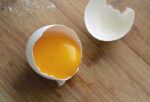

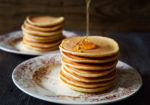
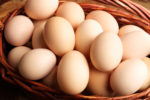
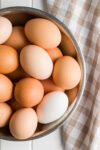
84 thoughts on “Preserve Eggs With Slaked Lime or Water Glass”
I had watched a You tube video of an Amish woman demonstrating how to preserve eggs with Calcium Hydroxide and a very large plastic container… ( about 5 gallons) she used a “cereal” bowl for the Calcium Hydroxide for that lg container… I have been using smaller plastic lidded buckets like a gallon and a half ( from pool chemicals) and put like a 1/4 of a cereal bowl into them and add only unwashed fresh eggs that appear completely clean pointy end down and mark the cover with the begin date and give it a number so I can use them in correct order. I tried some that were almost a year old and they broke clean and cooked like a store bought egg would.. I am impressed with this method and like feeling secure that I have eggs I can bake with or eat even if the chickens are on vacation. I did have a bucket that some one manhandled and broke some of the eggs ( which I didn’t discover immediately) .. this bucket was smelly and I got rid of the entire mess… but learned how to prevent that from happening again… I keep them in my cellar close to a dehumidifier and this seems to work well. Thanks for posting this thread… I’m always trying to learn more. as and unrelated aside,………. I make scrambies for the baby chicks to mix in with their starter and they really love that!
Good for you! I’m happy to hear you’ve had success with keeping eggs the old fashioned way.
HI! I preserved some of our farm fresh eggs with slacked lime. I used a plastic bucket with a lid. I covered the eggs with the solution, but left about 2 inches of room at the top. It was kept in our cool basement. When I opened it about 3 months later now, it has mold on the lid and the rim of the plastic that isn’t under the solution. I removed one of the eggs and cracked it into a bowl. It smells fine and looks beautiful. My understanding is that the lime and the bloom on the egg should have protected them and the eggs will most likely be fine if they smell and look ok. Any thoughts?
I’m not an expert and maybe someone else has some ideas. But my thoughts are that the eggs are fine since the mold isn’t in the water itself. If it was me, I’d eat a few eggs (smelling them first).
I wonder if your basement is too humid, or if you should try a ceramic or glass container rather than plastic. I have heard of other people using plastic buckets, but didn’t think they stored the eggs in a basement.
You might try an experiment and place your eggs in an area of your basement where it will stay cool but perhaps have better air circulation. And try putting some eggs in glass or ceramic at the same time and open them up together.
Congratulations on trying something new!
First time trying. Read and listened a lot, tried different amounts of hyd. lime, from a lot, down to 1 tsp in 2 cups Ro water. All had settling on the bottom of containers. Do both ( large to small settling) do the same job as long as there is Hyd. lime on bottom meaning water is satrated with lime? Even tried boiling it, same settling (using ro H2O)
I’m not sure what you mean when you say “ro” for “ro water.” I wonder if you have hard water (water with minerals) and that may be why your lime does not dissolve well. Does anyone else have any suggestions?
The lime settles- theres still plenty dissolved in the water.
Preserving eggs
by United States. Bureau of Animal Industry
Publication date 1919
https://archive.org/details/preservingeggs15unit/page/n1/mode/2up?view=theater
Thank you for the link! Readers may want to check it out. (Preserving Eggs, Boysand Girls Poultry Club Work).
In England it is illegal to sell washed eggs from what I’ve read. That’s why you see a basket of eggs sitting on the table in a lot of old pictures. Fresh unwashed eggs will keep for two to three weeks without refrigeration.
You’re right. My husband was in the Air Force and we lived in Okinawa, Japan, years ago. All eggs were sold unrefrigerated in the stores.
Can I reuse the limewater solution?
The way I interpret the process, I believe they did reuse the limewater solution, but added more lime and boiling water due to some evaporation and possible absorption into the egg shells. I’d probably only reuse it once again; after all, the lime isn’t so expensive to replace.
Does the type of container matter that you mix the water and lime in? Can it be a large metal pot or does it need to be glass or stone? Also for the long term storage vessel, can that be a 5 gallon plastic bucket or a large glass container? It’s so hard to find those antique stone storage pots with lids.
Glass and stone are probably best, but I wouldn’t buy an antique stone container because you don’t know if the glaze is still safe. Metal should be fine as long as you have a tight fitting lid.
I’ve heard from people who use the 5 gallon plastic buckets and they do well with them.
Just make sure that whatever container you use, you don’t move it once eggs are in it because it’s so easy for them to crack, and that will ruin the whole batch.
Also, make sure you keep them covered in the solution, checking now and then to see if any has evaporated.
And last, store your container where it’s not damp or too hot.
Good luck!
Hi! I just bought a huge bag of hydrated lime at the hardware store. When I got home I noticed it said “type s” on it. Is that kind ok to use for water glassing eggs?
Did you buy Quikrete lime? I looked at Lowe’s website and type S is not the correct lime to use for preserving eggs. Under the Community Q&A section, someone asked if you could use this lime for preserving. A representative from Quikrete said No (see below).
“Do not use QUIKRETE® Hydrated Lime – Type S for pickling, since it not rated to be food grade. QUIKRETE® Hydrated Lime – Type S is used for building construction, where it is mixed with cement, sand and other ingredients to make masonry mortars or stuccos.”
The kind of lime you want is pickling lime or calcium hydroxide.
Also, using lime water is not the same as using water glass. Water glass is sodium silicate.
It’s best to preserve farm-fresh eggs that have not been washed like grocery store eggs. Eggs are porous and so you don’t want chemically cleaned eggs if you can help it.
Good luck with preserving eggs!
I found a broken egg in my bucket now what do I do?
I looked through quite a few of the 1800s cookbooks as well as some modern articles online about preserving eggs. I haven’t been able to find anything specifically about what to do if one of your eggs crack.
However, in one of the older cookbooks, it says,”The shells also must be free from even the tiniest crack. One cracked egg will spoil a large number of sound eggs when packed in water glass.”
I don’t know if you used water glass or lime water.
If this happened to me, I’d carefully pull out all the eggs, place them in water temporarily, and try one of the eggs.
Crack it into a saucer and look at it. See if the yolk and white are separated like eggs should be and then smell it to see if it has an odor. If not, lightly cook it and try it. If it tastes alright, refrigerate the rest of the eggs and use them fairly soon, always cracking each one for looks and lack of odor.
If you have too many to refrigerate, you could try putting the eggs into another solution, but remember to note that these eggs need to be used first and to test before eating.
We used pickling lime and have a couple eggs with cracks in them but what is strange is that they are still preserved and when cracked its only a little barrier like it preserved the rest of the egg and sealed the hole from leaking. Are these eggs still ok to eat because they smell fine, might just have some of the lime water that leaked in the white.
I’d guess the cracked eggs are fine as long as they smell good. But to test, crack them one at a time into a saucer and see if the yolk stays complete. If it runs into the white, you may not want to take a chance.
Also, if the cracked eggs leaked into the limewater, I’d carefully remove the eggs and strain the lime water through a cheesecloth or other fine strainer. Wash the container, then put the eggs and limewater back. The rest of your eggs should continue to be preserved.
Angela Johnson
We tried this last night and our lime separated from the water, is this still ok??
If the lime separated from the water so quickly, you may not have boiled or mixed it enough. If you can very GENTLY remove the eggs, do so and reboil or remix the lime water. If you boil it, make sure it is completely cool before pouring back over the eggs.
Examine the eggs carefully, though. If one is cracked, it’ll ruin the whole batch.
Also, make sure the eggs are completely covered in lime water. Check the container occasionally, and if it’s evaporating, make more and pour it on.
If you have too many eggs to safely remove them without cracking, make some new lime water and pour it on top. Don’t stir, though. You may crack an egg.
Good luck.
The lime will separate. No worries plenty is dissolved. Mine are perfect after 6 months- the bottom of the jar and a few eggs have the settled lime.
Hi. I have had a bit of luck with all this now.. first started about 9 months ago or so .. used hydrated lime and “kinda “followed the steps loosely… added a whole heap of extra lime when I first started because I didn’t realise it was in American measurements instead of normal people measurements…. anyhow 9 months later I still have a 2 15L buckets which has 100 eggs in each.. started with 4 buckets. Added another 100 today.
They are as fresh as they day they were laid. You can test them before eating by placing them in some water and seeing how much the raise or float.. every now and again I gently stir the solution around gently to mix it all up. Had one or two broken eggs but has done no harm at all… I know that’s not recommended but if you think about it… the solution protects the eggs so no bacteria should enter them….
How exciting! I’m glad your experiments worked out. Yes, all measurements are U.S. based because I’m using old cookbooks in the public domain printed in the U.S. I’ll look for a conversion chart to add to my site. That’s a good idea.
Can i add more eggs if the water and lime have separated? All the lime is at the bottom
It might be best to carefully remove the eggs you already have from the water. Then completely stir the mixture until it’s mixed together again. Place the new eggs on the bottom and the older eggs on top. Be careful, though. One cracked egg will spoil the whole batch.
Also, make sure you have enough solution to completely cover the eggs. You may need to add a little more waterglass and water. And cover the container to keep the air out.
Why does my eggs want to float in glassing water i know eggs arent old am i doing somethi g wrong or it normal any tips
I read several articles on using waterglass to preserve eggs. Here are some suggestions. A floating egg usually does mean the egg is not good, so try cracking one and smelling it. If it smells alright, then that’s not the problem.
Other suggestions include not using eggs that have been refrigerated and not using store-bought eggs. Store-bought eggs have been both refrigerated plus they’ve been washed, which removed the bloom, the natural coating on an egg that helps preserve freshness. And even the freshest store-bought eggs are at least 3 days old and probably older.
If your floating eggs have no odor, try putting a plate (carefully) over the eggs to keep them submerged. And try farm fresh unwashed eggs if you do another batch.
Good luck!
Where can you buy slake lime, and how do I know I got the right kind?
You can order it from Amazon or any garden or building supply store. Make sure you ask fo “hydrated lime,”to make sure you get the right type.
Is it okay to use fresh eggs that are not one day old? If not, why not? (Just curious) I have about 2 dozen eggs that are about a week old & plan on trying a separate container to see how long they’re good for. One never knows until they try, eh?
About washing the eggs anyway . . . makes sense that the mixture eventually will dissolve the bloom on the shell . . . maybe want to give that a try as well. If I can remember, will check back in about 6 months & let you know – that is . . . unless someone already has & wants to share this valuable information.
I’m sure it’s fine to use week old eggs. The cookbooks probably give the advice for the best results. Like you said, it doesn’t hurt to try, does it? I’d love to hear how it goes. Looking forward to hearing from you again.
Is the water glass supposed to separate it looks like all the lime is sitting in the bottom on top of some eggs
Water glass and lime water are two separate solutions used to preserve eggs. Make sure your container is tightly covered and your eggs always stay submerged (regardless of which method you use). If the solution evaporates, add a little more.
But if a thin white crust appears on the limewater solution it’s because the lime comes in contact with the air and it does no harm.
As with any egg preservation method, always crack your eggs in a saucer prior to using just to make sure the egg is good. You wouldn’t want to ruin a recipe by using a spoiled egg.
We are now using eggs that have been limed for 6 months. Has anyone else had a problem with the yolks being stuck to the inside of the shell, causing the yolk to break upon crack and release? They still taste wonderful, but this substantially reduces the chance of the perfect over-easy egg!
I haven’t read of anyone having that problem. I hope someone has some advice for you. I’m sure glad your lime water eggs turned out well.
I have that same thing happening.
Waterglass is sodium silicate and lime is calcium carbonate — two very different materials. Just because they are used in similar ways to preserve eggs does not mean they are interchangeable or even similar. Please use only one or the other.
The comments about store-bought eggs NOT being fresh are correct. They had the protective bloom washed off of them days or weeks earlier thus allowing bacteria, mold, fungus and yeast direct access to the shell for a very long time.
Rinsing truly FRESH eggs in hot water immediately before immersing them in lime water or waterglass solution does not reduce the preservation capabilities of these techniques — because it’s the high pH of these solutions that kills existing bacteria and prevent new bacteria from getting into the eggs. So if you want your preservation solution to remain as clean and clear as possible, wash your FRESH eggs in hot water immediately before preserving them.
Never stir the eggs or the preservation solution after the eggs are added. The only time the solution should be stored is during its preparation. You’re just asking for trouble if you move the eggs after they are placed into the preservation solution.
You can plan on rotten eggs if you ever allow the eggs in the preservation container to be exposed to air. It is critical that all eggs are continuously covered by at least one inch of preservation solution until you eventually extract some for use. This means you must check the container periodically, and add more preservation solution if it starts getting low because of evaporation.
The cooler the preservation solution the better, provided that it remains above the freezing temperature of water. If you live in a hot climate you should find a cool place to store it.
Using waterglass rather than lime water will produce preserved eggs without any unusual flavors. Lime water tends to change the flavor of the preserved eggs somewhat, especially when they are preserved for an extended period of time.
Thank you for your detailed comment. It seems to be a tricky process.
As i live here in the usa where can i buy the waterglass for preserving my eggs by this method
I found it online at Lehman’s.
https://www.lehmans.com/product/water-glass-liquid-sodium-silicate
If you don’t want to buy it inline, go to a home maintenance store like Homr Depot or Lowe’s and ask for:
WATER GLASS – LIQUID SODIUM SILICATE
Good luck with preserving eggs.
Can a person use fertilized eggs in hyderated Lyme to preserve them or must they be unfertalized?
From everything I’ve read, there is no difference between fertilized and unfertilized eggs when preserving them. I’m including a link to an article all about fertilized eggs. I have never raised chickens, but evidently it’s hard to determine if eggs are fertilized or not. I hope this helps. Good luck with preserving your eggs.
https://www.raising-happy-chickens.com/fertile-chicken-eggs.html
Hi! Thanks for this info, especially regarding the different products used. I do have to make a tiny correction, though.
“Slack” means to mix with water. It’s actually the way someone in olden days (mis)spelled the word “slake” which means to let it soak up ample water. As in, to slake one’s thirst.
Happy preserving!
In one comment you indicated that sodium silicate is a form of lime. Not so. Completely different substance, often used to glue boxes shut.
Sodium silicate has a wide variety of uses. Liquid glass is often used to preserve eggs.
This is from Wikipedia: “Sodium silicate is also the technical and common name for a mixture of such compounds, chiefly the metasilicate, also called waterglass, water glass, or liquid glass. The product has a wide variety of uses, including the formulation of cements, passive fire protection, textile and lumber processing, manufacture of refractory ceramics, as adhesives, and in the production of silica gel. The commercial product, available in water solution or in solid form, is often greenish or blue owing to the presence of iron-containing impurities.”
https://en.wikipedia.org/wiki/Sodium_silicate
Yes but whole point of waterglass is to preserve the egg so i would have thought the washing of eggs make little difference as the solution will likely dissolve the coating anyways, seems that the actual waterglass element cant penetrate egg or at least the inner membrane lining of the egg or regardless of the coating being there or not it would affect egg as coating is soluble to water washing ectr. Actual eggshell i understand is porous regardless and with lime preserving natural coating would last no time at all!
The information about not washing eggs was quoted from an 1800s cookbook. That was the opinion at the time. I don’t know if it actually makes a difference or not. Other information I’ve read from that time period says to make sure the eggs are perfectly clean. That may mean to wipe off any dirt from the egg, though, and not necessarily to wash it.
Is it common to have a slight odor in the egg/lime solution or did something go wrong? This is my first attempt at storing eggs.
I found an article “Keeping Eggs Over the Winter” on Resiliance.org and it mentioned a slightly musty odor. Here’s the link:
https://www.resilience.org/stories/2016-10-27/keeping-eggs-over-the-winter/
I’ve never preserved eggs myself, but in all the old cookbooks from the 1800s and in modern articles or videos, they all stress preserving FRESH eggs. But I think once you crack your eggs, you’ll know immediately if they’re good to eat based on any rotten smell or perhaps how the egg looks.
Congratulations on trying something new.
it will have a slightly different smell than a fresh egg. the white will be more watery, and the yolk is not as thick. I guess i might call it ‘musty’ smelling? but it is NOT a ‘bad egg’ smell. That is undeniable and you’ll know if it’s bad. with the normal smell (i kept my lime preserved eggs over a year and not one went bad) it is yes, a bit different from fresh, but definitely not spoiled or rotten. They’re great in baking, casseroles, omelette, and scrambled even. Just don’t try to separate them out for mirangue or such. over easy won’t work too well either.
Thank you for this thread. I have 2 gallons of eggs preserved in the lime solution from back in September/October. I’ve been using them recently in baking and for breakfast. The whites are definitely watery and I’ve only had a couple of yolks that didn’t break when I cracked the eggs open. There was also a different smell, not bad, but that must be from the lime.
I think I’ll just store my extra eggs next time in a cool area or in our extra refrigerator as I like to cook up over-easy eggs for breakfast and I’m not fond of the watery yolks.
Is this the correct lime?
(Try to attach picture.)
Also, I put up 100 eggs in a glass container with a bail.
I mixed the up a little a few times and may have gotten over zealous this last time. Found a dozen cracked eggs . Removed r
Everything and washed container and rinsed off eggs.
But now the question was is can I replace the remaining 88 eggs in a new batch of hydrated Lime?
They were still coated with the lime on them and have a white-ish layer on them.
I wasn’t able to view your picture, but the lime to use is Sodium Silicate. From what I’ve read in old cookbooks, they suggest you put the container in a place where you never have to move it to prevent cracking your eggs. I don’t remember reading that they mixed the lime up after packing the eggs. But I did read that cracked eggs can ruin the whole batch.
I’d hate to lose 88 eggs, too, and would probably try putting the eggs in a new batch of lime. I think if they spoil, you’ll be able to tell by the smell when you crack them.
Lime is calcium hydroxide, NOT sodium silicate.
You are correct. But this blog post is about Lime AND Water Glass. Slacked lime/slaked is calcium hydroxide and water glass is sodium silicate.
Can you water glass lightly washed eggs? I ask because it gets muddy in the spring, and I can’t imagine it is beneficial to store eggs with mud and whatnot on them. I don’t want to wash with soap and water, but I would like to get the dirt off. Is it safe to rinse with cool water before storing, or would I be better off finding another storage method?
From what I’ve ready in old cookbooks, people just wiped or rinsed their eggs off with water before preserving them. If they are especially muddy, you might try a bit of apple cider vinegar in the water. You’re correct in not wanting to wash them in soap and water.
Why was lime put in the bottom of the vessel and then water mixed with lime added? Why not just add more lime to the water?
The recipe says to “Put some lime in a large vessel, and slack it with boiling water till it is of the consistence of thin cream.”
So they’re putting lime in a conainer, then pouring boiling water over it. Slacking means to mix.
“When it is cold, pour it off into a large stone jar. Be sure that the eggs are fresh and place them in the jar, with the pointed ends down, being sure that each end is perfectly sound.”
So they’re waiting for the lime water to get cold, then pouring it into a stone jar, when they will then put eggs in it.
Could it be that they were actually talking about slaking pure lime (i.e. in order to make the calcium hydroxide = slaked lime) when they said put lime in the vessel and then slake it with boiling water in that old recipe?
If they were literally making the “slaked lime” as the initial step in that recipe, then that is one less step than most modern egg preservers will need to take, since generally the modern preserver will not be starting with pure lime (caustic quicklime) but rather with “pre-” slaked lime, calcium hydroxide.
It’s so hard to tell for sure when reading old recipes, but based on what I’ve read, I assume they take pure lime and slake it with boiling water at the time they are ready to preserve their eggs. Long ago, ingredients were simpler without anything or much of anything added.
I am just wondering how long the egg is good for after the solution is rinse off?
I’ve never read anything about that in the old cookbooks, but I don’t think you’d pull eggs out of a preserving solution until you were ready to eat them. Maybe today you could keep preserved eggs in the refrigerator for a few days, but I don’t really know.
I am really interested in preserving all kinfs of food, electricity is epileptic in my country and storage facilities are non-existent, so this knowledge will be of immense benefit
I’m glad you’re enjoying my blog posts. Just remember that everything posted is from 1800s cookbooks. So you may want to also read modern food storage articles or books.
I don’t have a way to measure the weight of the lime, what would be the equal measure of 8 weighted oz of lime…?
I don’t see where you are referencing “8 weighted oz of lime,” but to measure powdered lime, you can use a measuring cup; just put it in loosely and don’t pack it. In the video, the presenter didn’t really measure his quick lime (hydrated lime).
The text on this post, taken from an 1800 cookbook, says “Put some lime in a large vessel, and slack it with boiling water till it is of the consistence of thin cream. You may allow a gallon of water to a pound of lime.”
After 3 months I ate my first lime preserved egg. How do I tell if they are ok to eat ?
It looked, smelled and tasted good.
Congratulations on preserving eggs! I would have done just what you did – eat an egg based on the way it looks, smells, and tastes.
There are scientific ways to test foods, but I haven’t read any recipes or articles that definitely explain how to tell if a preserved egg is alright to eat. I figure as long as I’m healthy, feel I treated my food safely, and I don’t detect any spoilage, I’ll try it.
How long will i keep my eggs in slake lime before sroring in a cool dry place
When chickens lay eggs, they have a natural coating that keeps out oxygen, harmful bacteria, and germs. In the 1800s, there was no commercial refrigeration, so eggs were not washed before using or storing to help keep them fresh. When you buy eggs commercially in the U.S, they have been washed and probably won’t store long out of the refrigerator. (Eggs are not always washed and refrigerated in other parts of the world).
According to what I’ve read in 1800s cookbooks, people kept their eggs in slaked lime until they were ready to use them, although they sometimes needed to renew the lime water.
Here are two links to articles on preserving eggs today:
http://www.preparednesspro.com/safely-preserving-eggs (using grocery store eggs and mineral oil)
and
http://starvation.news/2018-02-26-simple-ways-to-extend-the-shelf-life-of-eggs.html
(several menthods using fresh, unwashed eggs)
can you use store bought eggs
This information was from old cookbooks written before there was electric refrigeration. I’m sure you can use preserve store-bought eggs as long as they’re still fresh.
Not correct. Store bought eggs have been cleaned therefore do not have the protective layer that inhibits bacteria from entering through the shell. You would just be wasting your money and your time. Not to mention the horrendous smell.
Yes, store-bought eggs have been cleaned. That’s why they must be kept refrigerated. Back when there was no refrigeration, eggs would not have been cleaned until ready to use. I have relatives who raise chickens and they do not clean their eggs, either. The eggs have no smell.
Just to clarify what Brother Thom was saying. You absolutely cannot waterglass/preserve eggs with these methods using eggs purchased at a grocery store (particularly if you live with in the USA). These days store bought eggs are washed (often with bleach) and the protective ‘bloom’ is removed which is what naturally keeps out bacteria (which is why eggs in the USA are always refrigerated- we’ve removed their natural protection from bacteria!). The bloom must be intact in order to preserve eggs. If you want to do this, you’d need eggs from your own chickens- or find a neighbor or friend who has chickens and request that they sell you unwashed eggs.
That’s true. We sanitise a lot more in the U.S. compared to other countries.
Also, the other part about store bought eggs is that they are NOT fresh. They’ve been sitting in storage, sitting in transport vehicles, and sitting in a warehouse, and then sitting in your grocery store. They are far from fresh.
That’s certainly true. I buy pasture raised eggs in the store, which I hope are fresher, but prefer to buy eggs at a farmer’s market.
Question: If you coat a store bought egg with mineral oil, could it then be stored in hydrated lime solution safely and successfully?
The best eggs to use are straight from the farm, before they are commercially washed. I’ve read many articles about people preserving eggs today, and that’s the advice most of them give. However, there are a few people who seem to be satisfied with preserving store-bought eggs, so you may want to try a dozen or so just to test.
But you don’t use two methods of preserving at the same time. Using mineral oil is one way and using a hydrated lime solution is another. You don’t want oil mixing in with your lime-water.